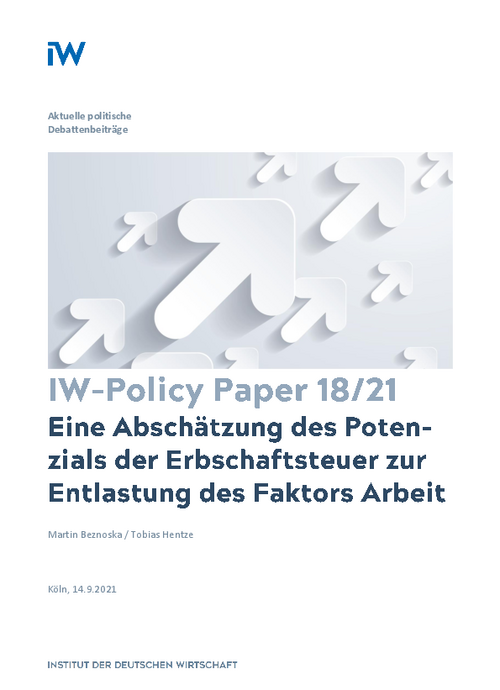The inheritance tax is often seen as an effective tool to reduce wealth inequality, to raise public revenues if needed, and to increase incentives to work by lowering the tax burden on labour, which is especially high in Germany, according to the OECD.

An Estimate of the Potential of Inheritance Tax to Relieve the Labor Factor

The inheritance tax is often seen as an effective tool to reduce wealth inequality, to raise public revenues if needed, and to increase incentives to work by lowering the tax burden on labour, which is especially high in Germany, according to the OECD.
However, expectations that higher taxation of wealth, not least in the form of inheritances and gifts, would lead to a decline in wealth inequality are often exaggerated. A higher inheritance tax would not directly reduce inequality.
From an economic point of view, a valid argument in favor of a higher taxation of inheritances and gifts would be the possibility of using additional tax revenues to reduce the burden on labor. A shift of tax revenues from income tax to inheritance tax could be used to increase incentives to work by lowering marginal tax rates for the working population.
As a reform model for the inheritance tax, many economists therefore recommend a broad tax base with relatively low tax rates, i.e. a departure from the current model with partly high tax rates but extensive allowances and exemption rules.
However, the potential additional tax revenues of such a flat-tax model are rather low, as the analysis of inheritance and gift tax statistics shows. The introduction of a flat-tax model with a broad tax base in inheritance tax would generate only little additional tax revenue and would consequently have little potential to generate relevant employment effects. This is particularly true if the personal allowances that ensure, for example, the tax-free transfer of owner-occupied real estate are to continue to apply.
In addition, a reform of inheritance tax must not disregard the effective burden on business assets in order to avoid negative effects on value creation and jobs. Flat-rate exemptions for business assets subject to a few conditions and long-term interest-free deferrals could eliminate bureaucratic burdens and uncertainties about the tax burden.

An Estimate of the Potential of Inheritance Tax to Relieve the Labor Factor

More on the topic

Global and European corporate tax reform concepts
The harmonization of corporate taxation at an international level has been on the political agenda for many years. Both the Organization for Economic Cooperation and Development (OECD) and the European Commission have presented reform projects in this regard, ...
IW
The Challenges to the Sustainability of Germany’s Public Finances
The German government’s fiscal responses to the Covid-19 pandemic and the Ukraine war in an attempt to cushion their impact have driven up the country’s general government debt-to-GDP ratio.
IW